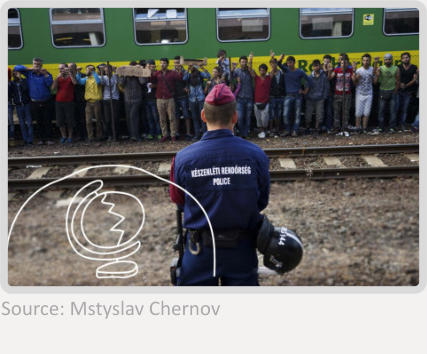

© 2023-2024 Oriental Institute, The Czech Academy of Sciences, Kevin L. Schwartz, and Ameem Lutfi


At
the
very
outset
of
the
21st
century,
Osama
bin
Laden
positioned
himself,
wittingly
or
unwittingly,
with
the
9/11
attacks,
as
one
of
its
likely
most
important
figures.
The
attacks
initially
served
to
undermine
multicultural
policies
in
relatively
ethnically
and
religiously
homogeneous
European
societies:
which
struggled
with
migration
from
other
continents,
ethnicities,
and
religious
backgrounds.
In
doing
so,
the
attacks
reshaped
global
politics
and
attitudes
toward
large
numbers
of
people
fleeing
political
and
economic
collapse
as
“the
other”—
instead
of
viewing
them
as
victims
of
misconceived
Western
policies
that
backfired
in
countries
governed
and
mismanaged
by
corrupt
politicians
and political and economic structures.
Its
resulting
fallout
was
evident
in
the
West’s
recent
failure
to
anticipate
mass
movement
toward
the
Kabul
airport
in
the
wake
of
the
U.S.
withdrawal
from
Afghanistan
and
the
Taliban
takeover
of
the
country.
The
West’s
initial
hesitancy
to
respond
to
the
plight
of
those
cooperating
with
Western
forces
and
institutions
in
the
last
two
decades
compounded
these
failures.
This
undermined
two
decades
of
multiculturalism
or
open
borders
and
further
empowered
populist,
right-wing
anti-immigration,
and
pro-nationalist
forces
in
Europe
as
well
as
North
America,
Asia
and Africa: particularly against Muslims, Jews, and people of color.
Western
democracies
pay
the
price;
the
brutalization
of
debate
and
dialogue
through
demonization
of
opposing
views,
abandonment
of
civility
and
etiquette
and
expressions
of
racist,
Islamophobic, and anti-Semitic attitudes becoming less socially taboo and more mainstream.
Changed
attitudes
have
made
Western
societies
more
vulnerable
to
intolerant,
anti-pluralistic,
and
counter-revolutionary
machinations
by
countries
like
the
UAE
and
Saudi
Arabia
.
Alarmed
by
the
strength
of
political
Islamic
groups
such
as
the
Muslim
Brotherhood,
in
the
wake
of
the
2011
popular
Arab
revolts,
the
Gulf
states
have
had
little
compunction
about
fuelling
anti-Muslim
sentiment in Western countries, including France and Austria
, to counter Islamists and their backers (Turkey, and Qatar).
Anti-Muslim
sentiment
is
bolstered
by
the
lack
of
support
from
Saudi
Arabia
and
the
UAE,
as
well
as
the
rest
of
the
Muslim
world,
for
persecuted
Muslim
communities:
such
as
the
Uyghurs
in
China,
the
Rohingya
in
Myanmar
and
Bangladesh,
and
Muslims
in
India-administered
Kashmir.
Saudi
Arabia
and
the
UAE
promote
their
socially
more
flexible,
but
autocratic
version
of
a
moderate
interpretation
of
Islam
that
preaches
absolute
obedience
to
the
ruler.
The
two
states’
use
their
interpretations
to
project
themselves
as
moderate
leaders
in
the
Muslim
world:
in
which Saudi Arabia and the UAE are
competing for religious soft power
with one another; as well as with Turkey, Qatar, Iran and Indonesia, the world’s largest Muslim-majority country.
"The
UAE’s
narrative
was
purposefully
designed
to
appeal
to
a
Western,
particularly
American
audience,”
claims
Gulf
scholar
Andreas
Krieg,
“in
the
aftermath
of
9/11,
the
Islamist
surge
during
the
Arab
Spring,
and
the
rise
of
the
Islamic
State.”
Yet,
for
Abu
Dhabi,
its
crusade
against
Islam
in
the
political
space
has
another,
more
sinister
objective:
depoliticizing
civil
society,
while
monopolizing
socio-political
power
and
authority
in
the
hands
of
the
state.
The
irony
is
that
the
religious
soft
power
rivalry
unwittingly
reinforces
each
other’s
efforts.
The
Emiratis
and
Saudis
encourage
Islamophobia,
in
cooperation
with
populists
and
Europe’s
far-right,
which
strengthen
the
Iranian
revolutionaries
and
Turkish
President
Recep
Tayyip
Erdogan.
Erdogan
projects
himself
as
a
pious
leader
who
defends
the
rights
of
marginalized
Diaspora
communities:
who
hail
from
‘black’
Turks
at
home
and
are
disenfranchised
by
the
Kemalist
Turkish
elite;
while
Iran
claims to represent the struggle of the downtrodden and disenfranchised.
The
populists
and
right-wing
nationalists
in
Europe
and
elsewhere
are
the
perfect
foil
for
Erdogan.
In
turn,
Erdogan’s
calls
on
the
Turkish
Diaspora
to
reject
assimilation
is
fodder
for
the
very
groups
the
Turkish
president
ostensibly
opposes.
“Ultimately,
these
are
two
right-wing
currents
that
profit
from
each
other,”
argues
political
scientist
Thomas
Schmidinge,
“Turkish
nationalism
colored
by
Islamism
on
the
one
hand
and
anti-Islamic
and
anti-Turkish
racism,
which
has
spread
throughout
Europe
and
Austria
in
particular,
on
the
other.”
Schmidinge
discussed
the
situation
in Austria as an example that repeats itself across Europe: in which the UAE, Saudi Arabia, and Turkey wage covert campaigns against one another.
Bin
Laden
must
have
a
grin
on
his
face,
as
the
current
scene
unfolds
in
Europe
and
the
U.S.:
irrespective
of
whether
the
former
leader
of
al-Qaeda
is
looking
at
the
world
from
above
or
from
down
under.
He
may
bemoan
the
plight
of
Muslims
in
much
of
the
world,
but
the
disarray
in
the
West
is
probably
greater:
in
part
to
his
lethal
handiwork,
which
has
probably
accomplished
more than his most imaginative dreams.







If you are interested in contributing an article for
the project, please send a short summary of the
proposed topic (no more than 200 words) and brief
bio to submissions@911legacies.com. For all
other matters, please contact
inquiry@911legacies.com.

CONTACT


At
the
very
outset
of
the
21st
century,
Osama
bin
Laden
positioned
himself,
wittingly
or
unwittingly,
with
the
9/11
attacks,
as
one
of
its
likely
most
important
figures.
The
attacks
initially
served
to
undermine
multicultural
policies
in
relatively
ethnically
and
religiously
homogeneous
European
societies:
which
struggled
with
migration
from
other
continents,
ethnicities,
and
religious
backgrounds.
In
doing
so,
the
attacks
reshaped
global
politics
and
attitudes
toward
large
numbers
of
people
fleeing
political
and
economic
collapse
as
“the
other”—
instead
of
viewing
them
as
victims
of
misconceived
Western
policies
that
backfired
in
countries
governed
and
mismanaged
by
corrupt
politicians
and
political
and economic structures.
Its
resulting
fallout
was
evident
in
the
West’s
recent
failure
to
anticipate
mass
movement
toward
the
Kabul
airport
in
the
wake
of
the
U.S.
withdrawal
from
Afghanistan
and
the
Taliban
takeover
of
the
country.
The
West’s
initial
hesitancy
to
respond
to
the
plight
of
those
cooperating
with
Western
forces
and
institutions
in
the
last
two
decades
compounded
these
failures.
This
undermined
two
decades
of
multiculturalism
or
open
borders
and
further
empowered
populist,
right-wing
anti-
immigration,
and
pro-nationalist
forces
in
Europe
as
well
as
North
America,
Asia
and
Africa:
particularly
against
Muslims,
Jews,
and
people
of
color.
Western
democracies
pay
the
price;
the
brutalization
of
debate
and
dialogue
through
demonization
of
opposing
views,
abandonment
of
civility
and
etiquette
and
expressions
of
racist,
Islamophobic,
and
anti-Semitic
attitudes
becoming
less
socially
taboo
and
more
mainstream.
Changed
attitudes
have
made
Western
societies
more
vulnerable
to
intolerant,
anti-pluralistic,
and
counter-revolutionary
machinations
by
countries
like
the
UAE
and
Saudi
Arabia
.
Alarmed
by
the
strength
of
political
Islamic
groups
such
as
the
Muslim
Brotherhood,
in
the
wake
of
the
2011
popular
Arab
revolts,
the
Gulf
states
have
had
little
compunction
about
fuelling
anti-Muslim
sentiment
in
Western
countries,
including
France
and
Austria
,
to
counter
Islamists
and
their
backers (Turkey, and Qatar).
Anti-Muslim
sentiment
is
bolstered
by
the
lack
of
support
from
Saudi
Arabia
and
the
UAE,
as
well
as
the
rest
of
the
Muslim
world,
for
persecuted
Muslim
communities:
such
as
the
Uyghurs
in
China,
the
Rohingya
in
Myanmar
and
Bangladesh,
and
Muslims
in
India-administered
Kashmir.
Saudi
Arabia
and
the
UAE
promote
their
socially
more
flexible,
but
autocratic
version
of
a
moderate
interpretation
of
Islam
that
preaches
absolute
obedience
to
the
ruler.
The
two
states’
use
their
interpretations
to
project
themselves
as
moderate
leaders
in
the
Muslim
world:
in
which
Saudi
Arabia
and
the
UAE
are
competing
for
religious
soft
power
with
one
another;
as
well
as
with
Turkey,
Qatar,
Iran
and
Indonesia,
the
world’s largest Muslim-majority country.
"The
UAE’s
narrative
was
purposefully
designed
to
appeal
to
a
Western,
particularly
American
audience,”
claims
Gulf
scholar
Andreas
Krieg,
“in
the
aftermath
of
9/11,
the
Islamist
surge
during
the
Arab
Spring,
and
the
rise
of
the
Islamic
State.”
Yet,
for
Abu
Dhabi,
its
crusade
against
Islam
in
the
political
space
has
another,
more
sinister
objective:
depoliticizing
civil
society,
while
monopolizing
socio-political
power
and
authority
in
the
hands
of
the
state.
The
irony
is
that
the
religious
soft
power
rivalry
unwittingly
reinforces
each
other’s
efforts.
The
Emiratis
and
Saudis
encourage
Islamophobia,
in
cooperation
with
populists
and
Europe’s
far-right,
which
strengthen
the
Iranian
revolutionaries
and
Turkish
President
Recep
Tayyip
Erdogan.
Erdogan
projects
himself
as
a
pious
leader
who
defends
the
rights
of
marginalized
Diaspora
communities:
who
hail
from
‘black’
Turks
at
home
and
are
disenfranchised
by
the
Kemalist
Turkish
elite;
while
Iran
claims
to
represent
the
struggle
of
the
downtrodden and disenfranchised.
The
populists
and
right-wing
nationalists
in
Europe
and
elsewhere
are
the
perfect
foil
for
Erdogan.
In
turn,
Erdogan’s
calls
on
the
Turkish
Diaspora
to
reject
assimilation
is
fodder
for
the
very
groups
the
Turkish
president
ostensibly
opposes.
“Ultimately,
these
are
two
right-wing
currents
that
profit
from
each
other,”
argues
political
scientist
Thomas
Schmidinge,
“Turkish
nationalism
colored
by
Islamism
on
the
one
hand
and
anti-Islamic
and
anti-Turkish
racism,
which
has
spread
throughout
Europe
and
Austria
in
particular,
on
the
other.”
Schmidinge
discussed
the
situation
in
Austria
as
an
example
that
repeats
itself
across
Europe:
in
which
the
UAE,
Saudi
Arabia,
and
Turkey
wage
covert
campaigns
against one another.
Bin
Laden
must
have
a
grin
on
his
face,
as
the
current
scene
unfolds
in
Europe
and
the
U.S.:
irrespective
of
whether
the
former
leader
of
al-
Qaeda
is
looking
at
the
world
from
above
or
from
down
under.
He
may
bemoan
the
plight
of
Muslims
in
much
of
the
world,
but
the
disarray
in
the
West
is
probably
greater:
in
part
to
his
lethal
handiwork,
which
has
probably
accomplished
more than his most imaginative dreams.
© 2023-2024 Oriental Institute, The Czech Academy of
Sciences, Kevin L. Schwartz, and Ameem Lutfi


Written by




If you are interested in contributing an article for the
project, please send a short summary of the proposed
topic (no more than 200 words) and brief bio to
submissions@911legacies.com. For all other
matters, please contact inquiry@911legacies.com.

CONTACT


















